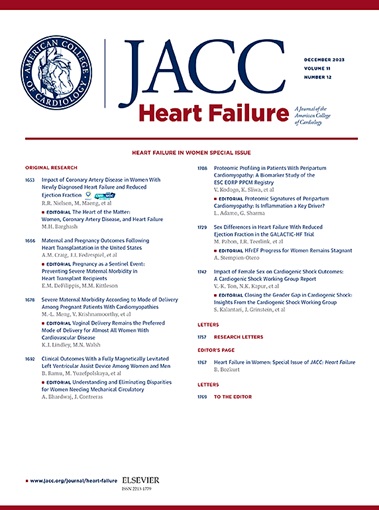住院患者经皮冠状动脉介入治疗量对急性心肌梗死-心源性休克后 30 天再住院率的影响。
IF 10.3
1区 医学
Q1 CARDIAC & CARDIOVASCULAR SYSTEMS
引用次数: 0
摘要
背景:关于急性心肌梗死(AMI)合并心源性休克(CS)的容量-结果关系的数据有限:关于急性心肌梗死(AMI)合并心源性休克(CS)的容量-结果关系的数据有限:在本研究中,作者试图评估经皮冠状动脉介入治疗(PCI)的住院量与急性心肌梗死合并心源性休克后再入院之间的关系:从2016-2019年全国再入院数据库中识别出成人AMI-CS患者,并根据年度住院PCI量将其分为医院四分位(Q1量最少到Q4量最多)。研究结果包括30天全因、心脏、非心脏和心衰(HF)再入院率:3954家实施PCI的医院共收治了49558例AMI-CS患者。PCI年中位数为174例(第一季度至第三季度:70-316例)。在第一季度医院接受治疗的患者平均年龄较大,为女性,合并症负担较重。第四季度医院的患者非心脏器官功能障碍、并发症和使用心脏支持疗法的比例较高。总体而言,30 天再入院率为 18.5%(n = 9179),其中心脏病、非心脏病和高血压再入院率分别占 56.2%、43.8% 和 25.8%。从第一季度到第四季度,30 天全因(17.6%、18.4%、18.2%、18.7%;P = 0.55)、心脏病(10.9%、11.0%、10.6%、10.2%;P = 0.29)和高频(5.0%、4.8%、4.8%、4.8%;P = 0.99)再入院率没有差异。非心脏病再入院率在较高的四分位数(6.7%、7.4%、7.7%、8.5%;P = 0.001)中更为常见,但经多重变量调整后并不显著。作为连续变量的医院PCI量与再入院率之间没有关系:结论:在AMI-CS患者中,尽管PCI量高的中心患者病情较重,但医院每年的PCI量与30天再入院率之间没有关系,这表明PCI量高的中心为CS患者提供了更好的治疗路径。本文章由计算机程序翻译,如有差异,请以英文原文为准。
Impact of Inpatient Percutaneous Coronary Intervention Volume on 30-Day Readmissions After Acute Myocardial Infarction-Cardiogenic Shock
Background
There are limited data on volume-outcome relationships in acute myocardial infarction (AMI) with cardiogenic shock (CS).
Objectives
In this study, the authors sought to evaluate the association between hospital percutaneous coronary intervention (PCI) volume and readmission after AMI-CS.
Methods
Adult AMI-CS patients were identified from the Nationwide Readmissions Database for 2016-2019 and were categorized into hospital quartiles (Q1 lowest volume to Q4 highest) based on annual inpatient PCI volume. Outcomes of interest included 30-day all-cause, cardiac, noncardiac, and heart-failure (HF) readmissions.
Results
There were 49,558 AMI-CS admissions at 3,954 PCI-performing hospitals. Median annual PCI volume was 174 (Q1-Q3: 70-316). Patients treated at Q1 hospitals were on average older, female, and with higher comorbidity burden. Patients at Q4 hospitals had higher rates of noncardiac organ dysfunction, complications, and use of cardiac support therapies. Overall, 30-day readmission rate was 18.5% (n = 9,179), of which cardiac, noncardiac, and HF readmissions constituted 56.2%, 43.8%, and 25.8%, respectively. From Q1 to Q4, there were no differences in 30-day all-cause (17.6%, 18.4%, 18.2%, 18.7%; P = 0.55), cardiac (10.9%, 11.0%, 10.6%, 10.2%; P = 0.29), and HF (5.0%, 4.8%, 4.8%, 4.8%; P = 0.99) readmissions. Noncardiac readmissions were noted more commonly in higher quartiles (6.7%, 7.4%, 7.7%, 8.5%; P = 0.001) but was not significant after multivariable adjustment. No relationship was noted between hospital PCI volume as a continuous variable and readmissions.
Conclusions
In AMI-CS, there was no association between hospital annual PCI volume and 30-day readmissions despite higher acuity in the higher volume PCI centers suggestive of better care pathways for CS at higher volume centers.
求助全文
通过发布文献求助,成功后即可免费获取论文全文。
去求助
来源期刊

JACC. Heart failure
CARDIAC & CARDIOVASCULAR SYSTEMS-
CiteScore
21.20
自引率
2.30%
发文量
164
期刊介绍:
JACC: Heart Failure publishes crucial findings on the pathophysiology, diagnosis, treatment, and care of heart failure patients. The goal is to enhance understanding through timely scientific communication on disease, clinical trials, outcomes, and therapeutic advances. The Journal fosters interdisciplinary connections with neuroscience, pulmonary medicine, nephrology, electrophysiology, and surgery related to heart failure. It also covers articles on pharmacogenetics, biomarkers, and metabolomics.
 求助内容:
求助内容: 应助结果提醒方式:
应助结果提醒方式:


